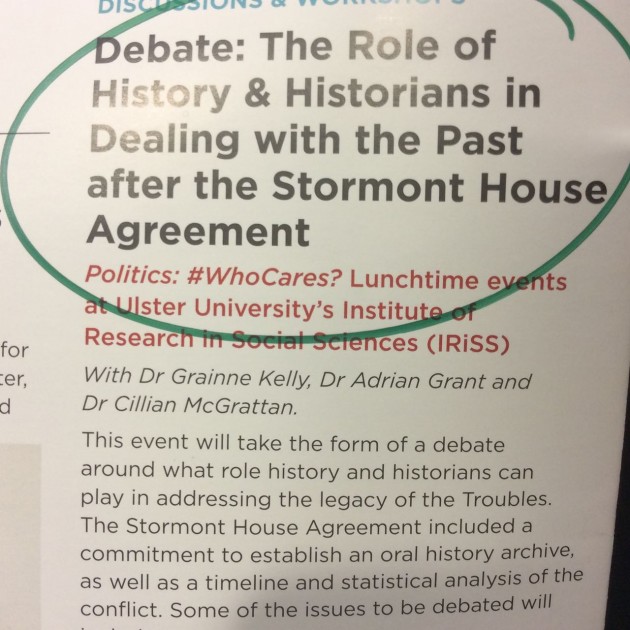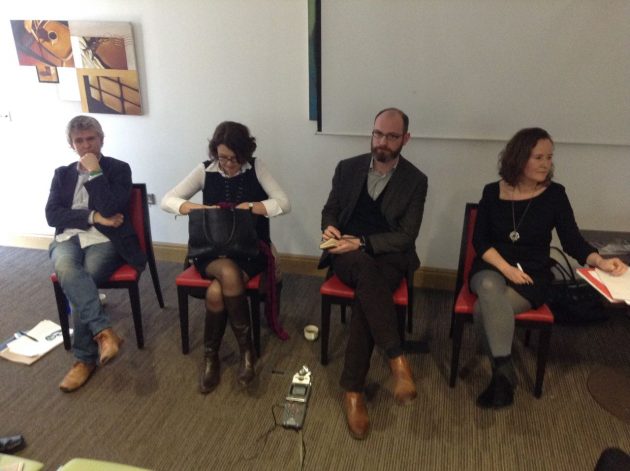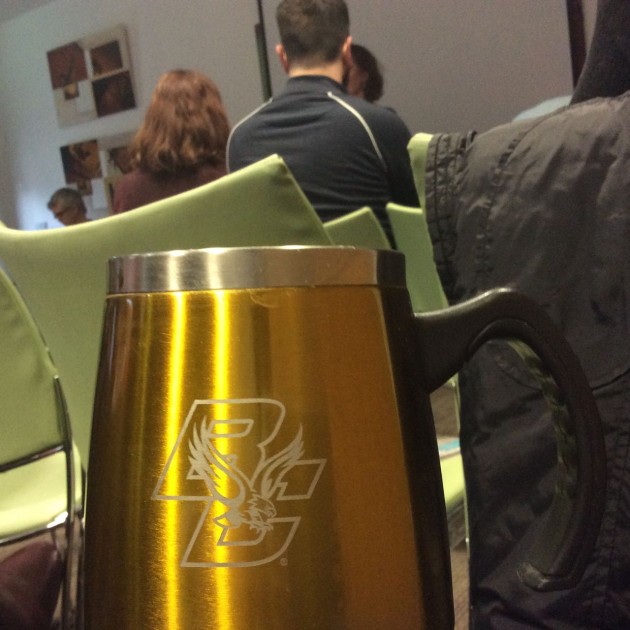 Today’s lunchtime debate in the UU’s Belfast campus was the best attended of the week – so far – and also the most fractious.
Today’s lunchtime debate in the UU’s Belfast campus was the best attended of the week – so far – and also the most fractious.
Grainne Kelly chaired a panel of Adrian Grant (historian), Cillian McGrattan (politics) and Susan McKay (journalist and writer) who discussed the Role of History and Historians in Dealing with the Past after the Stormont House Agreement.
Adrian Grant started by looking at definitions of history (objective truth? or an artform based on narratives of the past?) and questioning whether historians can be trusted to write objective, value-free history. After all, the sources historians uncover and use often rely on “the parts of the sea in which they are drawn to fish”. He noted that in addressing our local history, we should be careful not to just include national and religious identities, but should seek out suppressed minority narratives too.
 Cillian McGrattan valued oral history (of which he could see no active examples in NI at the moment) over storytelling (which met a community need but was not subject to peer review). He spoke of a surfeit of memory and commemoration after the end of World War 2 that did little to address the collective trauma (particularly in Germany). He looked at the Stormont House Agreement’s commitment to set up an oral history archive and noted that a voluntary archive would not necessarily mean it was inclusive. While those responsible for Troubles’ deaths are in proportion 60% republican : 30% loyalist : 10% state, he reckoned that the republican commemoration industry would dominate the storytelling. As currently explained, the HIU (Historical Investigations Unit) is centred around truth recovery and storytelling, but without cross-testimony.
Cillian McGrattan valued oral history (of which he could see no active examples in NI at the moment) over storytelling (which met a community need but was not subject to peer review). He spoke of a surfeit of memory and commemoration after the end of World War 2 that did little to address the collective trauma (particularly in Germany). He looked at the Stormont House Agreement’s commitment to set up an oral history archive and noted that a voluntary archive would not necessarily mean it was inclusive. While those responsible for Troubles’ deaths are in proportion 60% republican : 30% loyalist : 10% state, he reckoned that the republican commemoration industry would dominate the storytelling. As currently explained, the HIU (Historical Investigations Unit) is centred around truth recovery and storytelling, but without cross-testimony.
Susan McKay quipped that journalists write the first draft of history and historians clean it up afterwards. Finding the “right atmosphere” to look at the past would be difficult. She read a transcript of a Kevin McAleer/John Byrne sketch that made the audience chuckle ever so inappropriately. Susan suggested that certain narratives are currently being resisted: (1) the level of evidence of sectarianism in the IRA campaigns needs to be admitted; (2) the sheer extent of collusion between loyalists and state forces will also have to be faced up to.
 Opening up to the audience, one man pitched in with his discomfort that the “intelligentsia” were setting themselves up as “a secular priesthood” and countered that a man in Tigers Bay with Google could be peer reviewed. Cillian’s objections to storytelling were pursued and re-visited. (There was the briefest of mentions of the Belfast Tapes/Boston College but real discussion.)
Opening up to the audience, one man pitched in with his discomfort that the “intelligentsia” were setting themselves up as “a secular priesthood” and countered that a man in Tigers Bay with Google could be peer reviewed. Cillian’s objections to storytelling were pursued and re-visited. (There was the briefest of mentions of the Belfast Tapes/Boston College but real discussion.)
Perhaps it was a good sign that at the end one mathematical attendee (writing notes on the back of old fanfold printer paper!) asked why the discussion had to end after an hour “since none of us have to go back to work”. He misjudged the audience, but he did point to an appetite for the topics and themes behind the Imagine!2015 Belfast Festival of Ideas and Politics.
Alan Meban. Tweets as @alaninbelfast. Blogs about cinema and theatre over at Alan in Belfast. A freelancer who writes about, reports from, live-tweets and live-streams civic, academic and political events and conferences. He delivers social media training/coaching; produces podcasts and radio programmes; is a FactCheckNI director; a member of Ofcom’s Advisory Committee for Northern Ireland; and a member of the Corrymeela Community.
Discover more from Slugger O'Toole
Subscribe to get the latest posts to your email.
